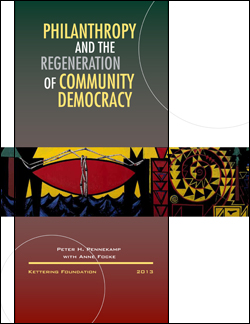Philanthropy and the Regeneration of Community Democracy
Kettering Foundation, 200 Commons Road, Dayton, OH, 45459, (937) 434-7300. http://kettering.org.
Download:
![]() Philanthropy and the Regeneration of Community Democracy (552 Kb)
Philanthropy and the Regeneration of Community Democracy (552 Kb)
The inquiry described in this Kettering Foundation occasional paper is located within a current debate in philanthropy and among its critics about the behavior of public foundations (including community foundations) and private foundations alike. The underlying assumption among foundations of all kinds has been that productive change comes from technical intervention through programs and services. However, various pressures, including frustration with results that all too often seem superficial and disappointing, have led to growing interest in something beyond traditional approaches. This different approach—variously described as community or civic capacity building, community-based problem solving, democratic institution building, comprehensive community change, and so on—is sometimes met with skepticism. This report is intended to give greater assurance that this “other” course for communities with support from philanthropy is indeed possible.
Peter Pennekamp, who was the executive director of the Humboldt Area Foundation from 1993 to 2012, explores the questions of why and how community democracy can be both a cultural choice and an organizing system for philanthropy. Pennekamp accomplishes this through stories that demonstrate the principles and practices, continually refined by experiences in Northern California communities and by lessons from other communities. He recounts a diverse business community jointly and openly tackling an economic downturn; deeply conflicted timber and environmental leaders meeting to find common ground; American Indian health activists accessing and contributing to the resources of the larger community; and diverse grassroots leaders identifying and acting on common concerns.
From these experiences, a framework of principles are drawn that begin to describe a perspective on the nature of community democracy and that provide a beginning set of conclusions about how philanthropy can develop productive partnerships from the perspective of a place-based, community democracy.

